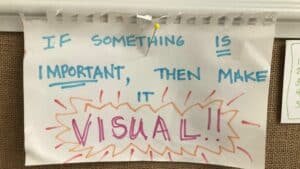
For years, I have written reminder notes for myself. My visual memory (the ability to recall what my eyes have seen) has always been particularly strong, but I’ve relied on this trait more in my 60s and 70s. Whether it is because I underwent chemotherapy treatment at age 60, or I have more leisure time as a retiree who doesn’t adhere to a rigid work schedule, or my brain is aging, the notes are a big help!
A Variety of Reminder Notes
Occasionally, I will post a note on a whiteboard hanging near my desk, or I’ll leave post-it notes on my computer screen, the countertop, or on a mirror. I will even lay a note card on the floor near the threshold from my bedroom to the hallway.

With all these signs placed strategically, I literally bump into them. Is it embarrassing to admit I need these obvious reminders? Yes, it is kind of embarrassing, but I’ve just resolved not to worry about it and create work arounds! They are also decidedly low tech!
Calendar Challenges
Last night I placed an 8.5” x 10.5” whiteboard on the table near the door to my bedroom. It reads “8:00 AM Tues – Pickleball.” Why? Last Friday, I impulsively rushed off to the YMCA to catch a few pickleball games, completely forgetting about a telephone appointment with my doctor. DARN!!!
That missed appointment cost me a fee because by the time I discovered my error and called the doctor, there was no way I could get squeezed back into his schedule. I had even spotted this telephone appointment on my iPhone calendar two days earlier, but I’m impulsive and would usually jump the tracks on a previously laid plan in an instant!
Acknowledging that an impulse of some kind will happen, I know that my chances are much better for making any appointment that is scheduled two days ahead, if I leave a note somewhere in my immediate environment.
Depending on how busy I am, I will scan the calendar for the week ahead and post those important appointments for the week on a small whiteboard or wall calendar adjacent to my desk. The redundancy seems to work:
- Enter the appointment in the iPhone calendar.
- Check the calendar each morning upon awakening.
- And finally, write the event on a whiteboard, post-it note, 4 x 6” card, or a calendar posted on the wall.
Visual Memory
Since I’m visually oriented, I can easily “tune in” to a colorful post-it or a colored felt-pen handwritten message. There are colorful post-it notes in my desk and kitchen drawers and a stash of colored felt-tip markers and blank 4” x 6” index cards on my desktop. The notes and reminders are discarded daily, so whenever I create one, it has some visual prominence.

Even as a college student studying for exams, I always remembered the page layout and ink colors that I used in class as I took textbook notes. When exam time came, I pictured the pages in my mind to begin recalling information. These days, post-its and other notes are an extension of this long-time habit.
Following cancer treatment 11 years ago, if I forgot something, I would panic. The doctors said it would get better and it did. Even now, I can walk into a room and forget why I am there, but I no longer panic.
Don’t Panic… Take 3-4 Relaxation Breaths
Obviously, a panicky reaction does me no good at all, and, in fact, it might delay the recall. I know I can accommodate a lapse in memory with coping strategies. My “Go To” behavior for arriving in a room with no clue, is to take a few relaxation breaths and affirm for myself that whatever slipped my mind will return. And it does, almost immediately!
One thing that I have forbid myself to do is refer to one of these events as a “Senior Moment.” Losing track of a thought, or forgetting a name or detail, is a frequent occurrence for almost everyone. Poor sleep, not feeling well, anxiety, depression, or a myriad of other influences can cause us to lose a train of thought, so the LAST thing I want to do is label it a senior moment!
There is too much ageism in our world already and I’m not going to feed the beast. I’m particularly keen on promoting positive, healthy, happy, or whatever aging and NOT using what I see as an ageist label!
Technology Helps
A few months ago, after forgetting three events in one week, I asked the Alexa application to announce daily at 7:00 AM “Check Your Calendar.” I use Alexa on an Amazon Echo device, which is a “smart speaker” (a Wi-Fi enabled device), and I have one in both the bedroom and the kitchen. There are many alternatives to the one I use.
Because I write the appointments in my iPhone calendar while I’m scheduling them, and I asked Alexa for the verbal reminders, I seem to be doing better lately. If I hear the reminder, I will check the calendar on my phone wherever I am.
Similarly, if I need to transfer the laundry or unload the dishwasher in a timely manner, I ask Alexa to remind me at a specific time or in 30 minutes. I also add my grocery lists into the iPhone calendar on days when I’m going to the store.
Ironically, the week before last, I considered cancelling the Alexa reminder because I had habituated (I thought) that behavior into a daily action. After Friday’s missed appointment, Alexa will continue reminding me!
While I earlier might have suspected these calendaring glitches were failures in the executive reasoning function of my brain, or that Alzheimer’s disease had set in, now I am a little more forgiving.
For years, I watched my elderly father deftly rely on a clipboard with his calendar of daily appointments and lists sitting on the side table next to his favorite chair. He died from Alzheimer’s Disease but remained at home until he was 93. I know he saved himself worry and confusion by being rigorous with using the clipboard.
I coordinated daytime and evening people coming to the house to look in on him. Ultimately, he needed to move into a memory care unit, but while he was at home, hetaught me a lot about just rolling with the aging process with his examples, so “Thanks, Dad!”
“The Kitchen Is Closed”
I’ve been following a weight loss program for the last couple of years, and one of the leaders suggested posting little signs or reminders in case I needed them. As someone who used to eat unwittingly to quash anxiety or feelings, I benefitted from making a little tent sign that I keep out on the kitchen counter.

The sign reads, “The Kitchen is Closed” and if I leave it on the kitchen counter, it greets me when I impulsively wander there for a snack. It seemed silly to do this, at first, but it worked. I slowly became more aware of my unconscious eating habits and curbed the behavior.
Does This All Seem Strange?
I suppose it might appear strange, leavingnotes or reminders around, but they work!
What memory tricks or cues do you use to manage your schedule or household tasks? Do you feel self-conscious about it, or have you accepted they are necessary tools?





